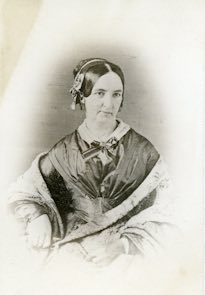Martha Coffin Pelham Wright’s life as an activist was influenced by her Nantucket Quaker heritage. With a strong female role model in her mother, Anna Folger Coffin, and the Quaker tenets of individualism, pacifism, equality of the sexes, and opposition to slavery, young Martha was well prepared for her future role as an abolitionist and suffragist.
Martha Coffin was the youngest of eight children, born in Boston on Christmas Day, 1806. The Coffin family moved to Philadelphia when she was three.
Following the death of her father in 1815, Martha’s mother opened a boarding house. Martha attended a Philadelphia day school and eventually transferred to a Quaker boarding school outside the city.
In 1822, Peter Pelham, a wounded soldier from the War of 1812, came to Philadelphia for medical care and boarded at the Coffin home. Martha, then 16, and Peter, 37, fell in love and wished to marry but Peter was not a Quaker and Martha’s mother refused to give consent. He left for a Florida military posting but maintained correspondence during his time away. Upon his return to Philadelphia in 1824, Coffin finally gave consent for the couple to marry. The Quaker community, however, refused to accept the marriage and Martha was expelled from the group for marrying outside the faith.
Following Peter’s early death in 1826, 19-year-old Martha and her year old child, Marianna, joined Martha’s mother in Aurora, New York. Here she taught with her mother at a Quaker girls’ school and in 1829 married David Wright, a young law student. As David’s law practice grew, the family moved to nearby Auburn, the county seat.
In the summer of 1848, Wright, by then six months pregnant with her 7th child, joined her older sister, Lucretia Coffin Mott, at a meeting with Elizabeth Cady Stanton, Jane Hunt, and Mary Ann McClintock in Waterloo, NY. These five women planned and led the first women’s rights convention, held in Seneca Falls, NY on July 19th and 20th, 1848 – an event of worldwide historic importance.
Thus began Wright’s twenty plus years of dedication and commitment to women’s rights and the abolition of slavery. She traveled extensively on behalf of the American Anti-Slavery Society and the National Woman Suffrage Association, which she served as president in 1874. Minutes from the 1874 NWSA meeting in New York City read in part, “Martha C. Wright, one of the most judicious and clear-sighted women in the movement‚“ a fitting tribute to one of the major 19th century reform leaders of New York State.

